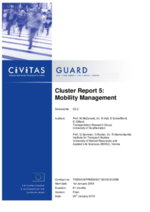Mobility management for companies
Thematic areas
Behavioural change & mobility management
Summary
Previously mobility plans for companies in Ghent have been produced on an ad hoc basis, with little effort made to organise common alternatives for home-work transportation. Ghent aims to change this by coordinating company mobility and stimulating the use of sustainable traffic modes.
Implementing sustainable mobility
This measure consists of providing support to Ghent companies voluntarily intending to implement a company mobilityplan. The Ghent City Council contacted several companies with the aim to coordinate company mobility plans within the ELAN-corridor and to stimulate sustainable transport modes for home to work trips. In support of these plans, each time, an employee oriented campaign to promote sustainable travel behaviour is set up.
- The Technologiepark Zwijnaarde/Tramstraat (TZT) was assisted by the Mobility Company and the private consultancy Traject in the set up of a mobility plan, and Mobi weeks were organised three times. A kind of gentlemen’s agreement between the GCC, companies of the TZT and other partners is made whereby every partner on the site engages himself to several measures to increase the use of sustainable mobility (September 2011 – March 2012).
- A mobility plan was also worked out for Fnac Ghent, a book and media store in the pedestrian zone. Also a mobility week was organised for the employees of Fnac Ghent.
- Also 11 other companies or organisations in the ELAN-corridor ended up with a company travel plan or are currently working on it.
There were no deviations from the original plan.
Progress
 Once the agreement is determined, the City Council and the company will:
Once the agreement is determined, the City Council and the company will:
- Analyse the current mobility characteristics of the company (nearest bus or tram stop, accessibility, parking spaces…);
- Analyse the current mobility behaviour of employees (transport mode, distance work-home, etc.); and
- Draft list of possible solutions/proposed actions a company can take, for example giving information to employees concerning all kinds of sustainable mobility.
The final company mobility plan will include main problems and solutions on specific transport issues for the company. In September 2009 the first edition of the CIVITAS Mobi-Weeks was organised by the Ghent City Council. In 2010 the action was repeated but a small group of volunteers assisted the city in organising the event. In 2011, a larger group of volunteers from the different participating companies will organise the third edition of event by themselves. In this way the initiative continue long after Ghent’s involvement in CIVITAS ends.
Outcomes
 Key result 1 – the target of 50% easily reached for making a company travel plan
Key result 1 – the target of 50% easily reached for making a company travel plan
13 out of 15 contacted entities ended up with a company travel plan or are working at it. This means that the target of 50% is easily reached. A lot of companies do realize that they have to work on the mobility of their employees because the traffic gets too busy in the area. Also the fact that the plans were made up by the Mobility Company and Traject, a private consultancy, made companies more enthusiastic about a mobility plan.
Key result 2 – the mobility plans and campaigns created a modal shift of 5,9% towards more sustainable transport modes.
The mobility campaigns at the TZT and the introduction of the mobility plans created a modal shift towards more sustainable transport modes. Between 2008 and 2011, a shift of 5,87% took place. An important factor in this change is probably the organisation of the mobility weeks, but also external factors could have played an important role, e.g. a general change in mentality related to sustainable movements or the general improvement in cycling lanes in the city of Ghent. For Fnac Ghent on the contrary not that much changed in the modal split, but the share of sustainable transport modes, namely 77%, was already very high.
Key result 3 – A good participation of employees in Mobi weeks
An average of 9,1% of the employees at the TZT participated in theMobi week which means that the target of 10% wasn´t reach. Nevertheless, the real share will be higher since not all participants did register for the event. All the employees of Fnac Ghent did participate in the Mobi week in some way or the other. There has to be said that this is easier to organise since the Fnac only employs 75 people. An important factor for the participation in the Mobi weeks is the fact that these were organised by the employees themselves which creates a certain peer pressure for colleagues to join and the attractiveness of certain activities organised in the framework of the Mobi weeks.








